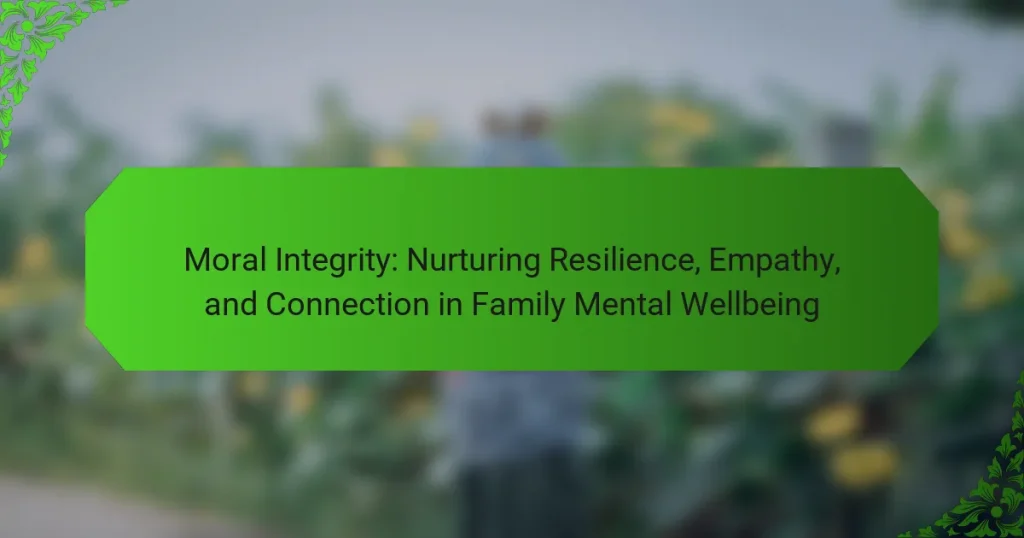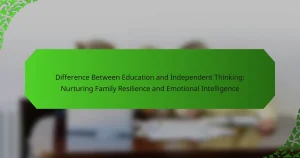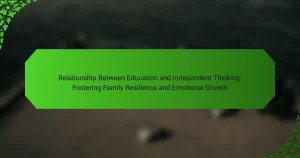Moral integrity enhances family mental wellbeing by fostering resilience, empathy, and connection. Families with strong moral values navigate challenges effectively, leading to improved emotional support and communication. Practicing empathy creates a nurturing environment, while cultivating connection strengthens relationships. Recognizing and correcting common pitfalls can further enhance family dynamics and mental health.
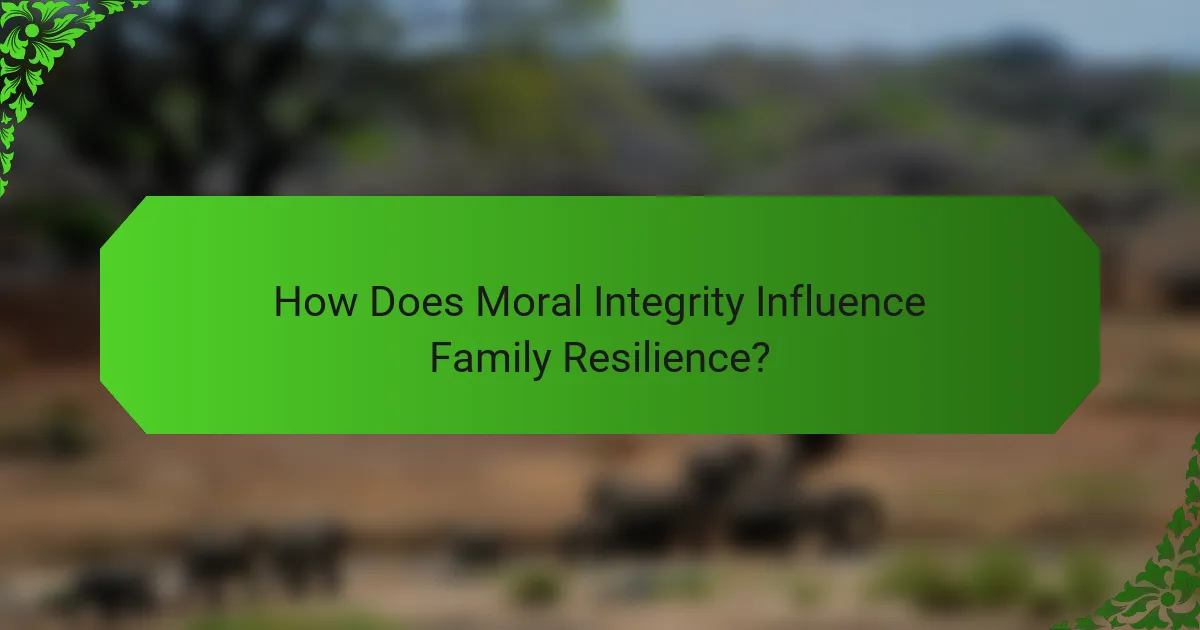
How Does Moral Integrity Influence Family Resilience?
Moral integrity significantly enhances family resilience by fostering trust, empathy, and open communication. Families with strong moral values navigate challenges more effectively, as shared principles create a supportive environment. This unity promotes emotional well-being, allowing members to rely on each other during difficult times. Research shows that families exhibiting high moral integrity report better mental health outcomes, reinforcing the connection between ethical behavior and resilience.
What are the key components of resilience in families?
Resilience in families hinges on moral integrity, empathy, and connection. These components foster a supportive environment that enhances mental wellbeing. Moral integrity encourages trust and honesty, while empathy promotes understanding and compassion. Connection through open communication strengthens relationships, enabling families to navigate challenges together.
How can moral integrity strengthen family bonds?
Moral integrity strengthens family bonds by fostering trust, respect, and open communication. When family members uphold ethical values, they create a safe environment for emotional expression and support. This foundation nurtures resilience, enabling families to navigate challenges together. Empathy grows as individuals model compassion and understanding, reinforcing connections. Ultimately, moral integrity cultivates a cohesive family unit, enhancing overall mental wellbeing.
What are practical ways to instill moral integrity in family life?
To instill moral integrity in family life, focus on open communication, modeling ethical behavior, and fostering empathy. Encourage discussions about values and ethical dilemmas. Promote resilience by teaching problem-solving skills and emphasizing accountability. Create a supportive environment where family members feel safe to express their thoughts and emotions. Engage in community service together to strengthen connections and instill a sense of responsibility.
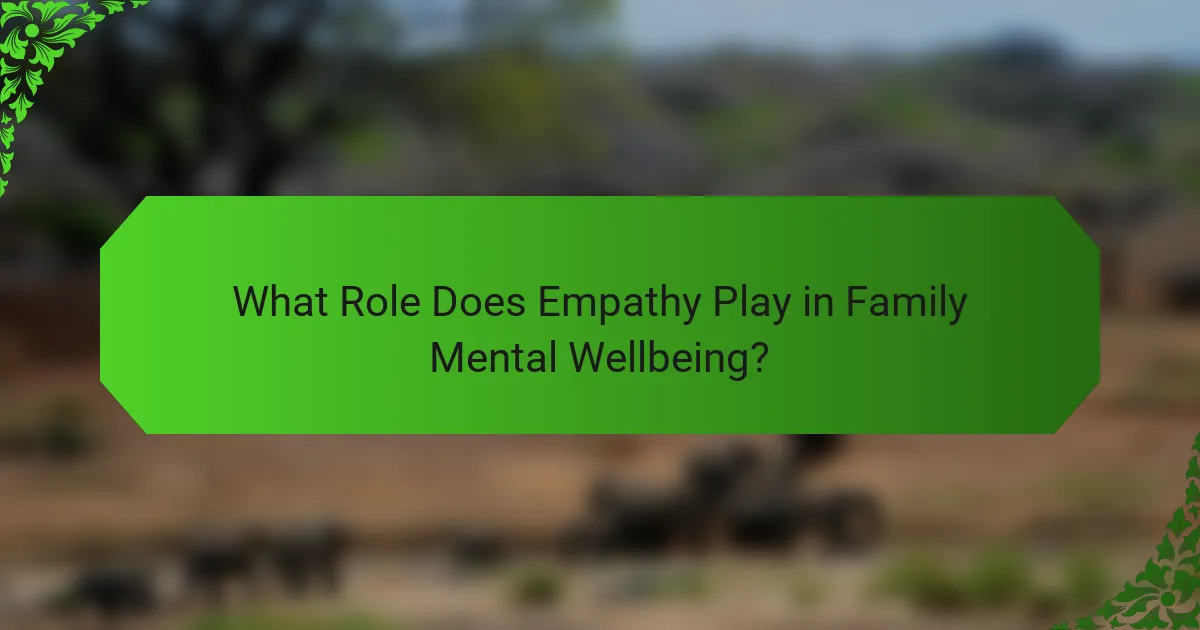
What Role Does Empathy Play in Family Mental Wellbeing?
Empathy is crucial for enhancing family mental wellbeing. It fosters deeper connections, promotes resilience, and supports emotional understanding. When family members practice empathy, they create a nurturing environment that helps individuals feel valued and understood. This emotional safety is essential for mental health, allowing family members to express feelings openly and seek support. Studies show that families with high empathy levels experience lower stress and improved communication, leading to stronger relationships and overall wellbeing.
How can fostering empathy improve family relationships?
Fostering empathy significantly enhances family relationships by promoting understanding and emotional connection. When family members practice empathy, they can better recognize and validate each other’s feelings, leading to improved communication and reduced conflict. This emotional awareness strengthens bonds and nurtures a supportive environment. Empathy also cultivates resilience, allowing families to navigate challenges together, reinforcing their unity and mental wellbeing. As a result, families that prioritize empathy often experience greater harmony and satisfaction in their relationships.
What are effective strategies for teaching empathy to children?
Teaching empathy to children involves engaging them in activities that promote understanding and connection. Effective strategies include role-playing scenarios to help children see different perspectives, discussing emotions through storytelling, and encouraging acts of kindness. Incorporating these practices nurtures moral integrity and builds resilience within family dynamics. As a result, children develop deeper emotional connections and a sense of community.
What activities promote empathy within the family unit?
Engaging in shared activities fosters empathy within the family unit. Family discussions about feelings, collaborative projects, and volunteer work enhance emotional connections. Activities like cooking together or playing games encourage cooperation and understanding. These experiences build resilience and strengthen family bonds.

What Unique Benefits Arise from Cultivating Connection through Moral Integrity?
Cultivating connection through moral integrity fosters resilience, empathy, and stronger family bonds. These unique benefits enhance mental wellbeing by creating trust and open communication. Families that prioritize moral integrity experience improved emotional support, leading to reduced stress and anxiety. Additionally, shared values strengthen relationships, promoting a sense of belonging and security. This holistic approach nurtures a positive environment where individuals thrive together.
How does connection contribute to overall family mental health?
Connection significantly enhances family mental health by fostering resilience, empathy, and support. Strong familial bonds create a safe environment for emotional expression, leading to improved mental well-being. Research indicates that families with close connections report lower stress levels and higher overall happiness. Nurturing these relationships cultivates empathy, enabling family members to understand and support each other effectively. In turn, this promotes resilience, equipping families to navigate challenges together.
What unique practices enhance family connection?
Engaging in unique practices such as family storytelling, shared rituals, and collaborative projects enhances family connection. These activities foster resilience, empathy, and a deeper understanding among family members. For example, regular family meetings can create a safe space for open communication, strengthening bonds. Additionally, volunteering together cultivates a sense of shared purpose and empathy, further solidifying connections.
What are the indicators of a connected family?
Connected families exhibit strong communication, shared values, mutual respect, and emotional support. These indicators foster resilience and empathy, enhancing overall mental wellbeing. Families that prioritize quality time and active listening cultivate deeper connections, promoting a nurturing environment. Establishing traditions and engaging in collaborative activities further strengthens these bonds, reinforcing the family’s moral integrity.

What Rare Traits of Moral Integrity Can Impact Family Dynamics?
Rare traits of moral integrity, such as honesty, accountability, and compassion, significantly enhance family dynamics. These traits foster trust and open communication, leading to stronger emotional connections. Families that prioritize these values often experience improved conflict resolution and resilience during challenges. Cultivating moral integrity nurtures a supportive environment, which is essential for mental wellbeing.
How can families navigate challenges with integrity?
Families can navigate challenges with integrity by fostering open communication, empathy, and shared values. Building resilience involves encouraging each member to express feelings and perspectives, which strengthens connections. Practicing empathy allows families to understand each other’s experiences, promoting a supportive environment. Establishing shared values creates a moral framework that guides decisions and behaviors during difficult times. This collective approach nurtures mental wellbeing and reinforces family bonds.
What are some uncommon practices that promote moral integrity?
Practices that promote moral integrity include open communication, active listening, and community service. These methods foster resilience, empathy, and connection within families, enhancing mental wellbeing. Engaging in family discussions about values strengthens bonds and encourages moral reasoning. Volunteering together cultivates empathy and reinforces a sense of shared responsibility. Additionally, creating rituals that celebrate honesty and accountability can instill lasting integrity.
How can families measure the impact of these practices?
Families can measure the impact of moral integrity practices through observation and feedback. Regular discussions about values can reveal shifts in resilience and empathy. Surveys or journals can track emotional well-being over time. Engaging in community activities fosters connection and provides tangible evidence of growth. Monitoring behavioral changes, such as increased kindness or cooperation, also indicates positive outcomes.

What are Common Mistakes Families Make in Upholding Moral Integrity?
Families often overlook key aspects that undermine moral integrity. Common mistakes include failing to model ethical behavior, neglecting open communication, prioritising material success over values, and not addressing conflicts constructively. These errors can erode resilience, empathy, and connection, which are vital for family mental wellbeing. Recognising and correcting these mistakes fosters a healthier family dynamic.
How can families avoid pitfalls in moral decision-making?
Families can avoid pitfalls in moral decision-making by fostering open communication and empathy. Encouraging discussions about values helps family members understand different perspectives. Establishing a strong moral framework based on shared principles enhances resilience against external pressures. Practicing empathy allows families to navigate dilemmas thoughtfully, promoting connection and understanding. Engaging in role-playing scenarios can further prepare families to face real-life ethical challenges effectively.
What are the consequences of neglecting moral integrity?
Neglecting moral integrity leads to diminished family mental wellbeing, eroding resilience, empathy, and connection. This absence can result in increased conflict, emotional distress, and weakened relationships. Families may experience a decline in trust, which is essential for healthy communication and support. As a result, the overall mental health of family members may suffer, leading to isolation and disconnection. Prioritising moral integrity fosters a nurturing environment that enhances emotional stability and relational strength.
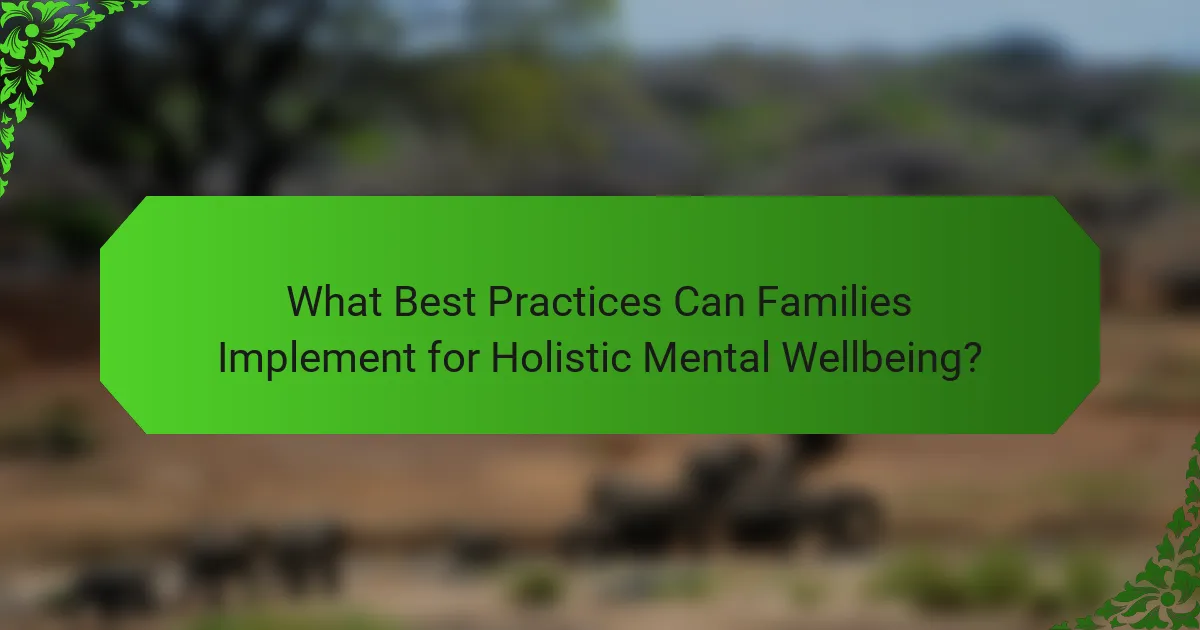
What Best Practices Can Families Implement for Holistic Mental Wellbeing?
Families can implement practices that foster moral integrity to enhance mental wellbeing. Prioritise open communication to build trust and understanding. Encourage empathy by engaging in activities that promote perspective-taking, such as volunteering. Establish routines that include family discussions, reinforcing values and resilience. Model positive behaviours, demonstrating accountability and support, which nurtures connection and emotional safety.
How can families create a supportive environment for mental wellbeing?
Families can create a supportive environment for mental wellbeing by fostering resilience, empathy, and connection. Establish open communication, encourage emotional expression, and prioritise quality time together.
Promoting moral integrity within the family strengthens relationships and enhances mental health. Families can engage in shared activities, such as volunteering or discussing ethical dilemmas, to cultivate empathy and understanding.
Setting clear family values and expectations reinforces a sense of security and belonging. Regular family meetings can provide a platform for discussing challenges and celebrating achievements, further nurturing a supportive atmosphere.
Additionally, modeling healthy coping strategies during stressful times teaches children resilience. Parents can demonstrate problem-solving skills and self-care practices, empowering children to develop their own emotional tools.
What expert insights can guide families in nurturing resilience, empathy, and connection?
Families can nurture resilience, empathy, and connection by fostering open communication, modeling moral integrity, and encouraging collaborative problem-solving. Open dialogue allows family members to express feelings and share experiences, strengthening emotional bonds. Modeling moral integrity through actions teaches children the importance of values like honesty and respect. Collaborative problem-solving promotes teamwork and empathy, helping family members understand different perspectives and build connections. These practices create a supportive environment that enhances mental wellbeing and emotional resilience.
